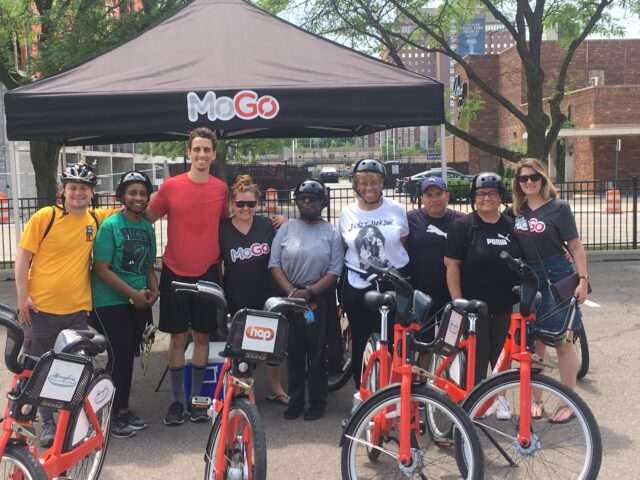MoGo’s Ambassador Program Scales Up
by Odochi Akwani, Writer and Content Manager
August 13, 2024
The MoGo ambassador program in Detroit returns this summer with hopes of engaging at more community events.

MoGo, Detroit’s nonprofit bike share system, began its ambassador program soon after launching in 2017 knowing how critical community engagement would be in reaching residents across the city’s 139 square miles. What started out as a neighborhood ambassador program with a handful of local events transformed into ambassadors hosting more than 100 community events each year.
“We get asked left and right if we can host bike rides. We can never manage saying yes to everybody when it’s just our core team,” says Jeremy Rosenberg, director of marketing and community outreach at MoGo. “What the ambassadors have allowed us to do is say yes to more of those things, be more present, and spread the MoGo gospel around the city.”
Last summer, MoGo took a step back in the number of events they were able to attend in Detroit due to a lack of staff capacity. According to Rosenberg, the system couldn’t attend several events they didn’t want to miss out on again this year. When BBSP announced our latest mini-grant round earlier this March, MoGo jumped on the chance to increase their capacity to be more present in the Detroit community and continue spreading the “MoGo gospel.”
“The ambassador program not only allows us to be out in the community, it’s also more people that are joining our organization and becoming advocates even after they’re done being ambassadors,” says Rosenberg. “People who become ambassadors become ambassadors for life.”
Rosenberg’s early days at MoGo were spent working as an ambassador. As one of these “ambassadors for life,” he’s seen firsthand how the program has evolved over the years.
“When we go to these events, we’re not just talking about buying a pass, or how to ride a bike. We don’t want it to be that simple,” says Rosenberg. “We’re a nonprofit with a mission and a vision to be a more equitable and accessible transportation service for the entire population that we serve.”
Ambassadors spend time educating Detroit residents about MoGo’s different equity programs. From the jump, MoGo has had a strong focus on equity with its cash payment option; $5 Access Pass, an annual membership for those receiving state benefits; Adaptive MoGo, an adaptive cycle fleet of 17 cycles for riders of all abilities; and it’s Street Skills Program, classes for people of all ages to learn or re-learn how to ride a bicycle.
“Detroit is a majority-black city. There are still a number of people who I engage with on a regular basis who think that bike share is for white hipsters who live in Brooklyn because that’s the way it is perceived in America.” says Rosenberg. “Us being out there and being faces and names, not just bikes sitting at a station with a kiosk next to it, is huge. It bridges that gap between what people think and a real understanding of what we are.”
The City of Detroit is currently in the early stages of creating a 29-mile pedestrian and bike pathway to reconnect Detroit neighborhoods. As the city expands its greenway space, community knowledge about what transportation options are available becomes even more important.
“We’re here to be a transportation service,” says Rosenberg. “Yes, we make a lot of our money being a recreational service too, and being a tourist attraction, but we’re here to serve the residents of the City of Detroit and the suburbs where our stations are. That always comes first. Once people meet us and hear that and hear what we’re doing to support that mission, it changes their perception.”
